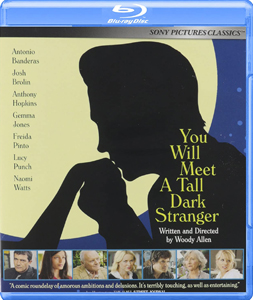It’s hard to describe “You Will Meet a Tall Dark Stranger” (2010) and not make it sound derivative of other Woody Allen movies. The way everyone plays romantic musical chairs calls to mind “Husband and Wives,” an older couple splitting because the husband wants to sow his oats makes me think of “Interiors,” and so forth.
Sound and fury signifying something
I like this movie a lot, but it can’t be because it has much original to say. Indeed, Allen’s story (narrated by Zak Orth) paraphrases Shakespeare by saying the events are sound and fury signifying nothing. I think that’s selling the film a little short, though.
A couple years later, Allen truly made his film about nothing, “To Rome with Love,” where none of the storylines interact. “Stranger” features a common thread: It’s about people who are endearingly real despite fitting clichéd roles. They don’t realize they are clichés.

“You Will Meet a Tall Dark Stranger” (2010)
Director: Woody Allen
Writer: Woody Allen
Stars: Anthony Hopkins, Naomi Watts, Josh Brolin
They are living lives lived a thousand times before – as outlined by the psychic (Pauline Collins) who is reading Helena (Gemma Jones). Everyone thinks they are unique, which lends “Stranger” an amusing glaze. In this way, your familiarity with Allen’s filmography might enhance your enjoyment.
Helena seeks psychic help because her husband Afie (Anthony Hopkins) has left her for a younger woman, and psychiatry is too expensive. (That’s kind of a joke by Allen, but he’s not wrong.) In “Interiors,” the younger woman is a classy lady still in the man’s dating range.
In “Stranger,” Alfie is an absurd stereotype who thinks he’s 30 again. His new wife is a ridiculous former prostitute with a lower-class accent, played by an on-point Lucy Punch.
‘Masterpiece Theatre’ meets Woody
Even though it lacks zingers, “Stranger” has some super-dry comedy. Helena describes her travails in dating a widower (Roger Ashton-Griffiths): “He left me for another woman. A deceased one. They’re always the stiffest competition. No pun intended.”
While the pun in that one-liner is intended by Allen’s screenplay, it’s truly not intended by Helena; it’s not in her nature. And generally, this is not a comedic film; it’s presented as a rather classy drama. “Stranger” hugely benefits from perfect casting of actors, most of whom are British or are good at doing the accent. This is “Masterpiece Theatre” meets Woody Allen.
It’s a joy simply to watch these well-known actors (most of whom are Allen newcomers) play roles written by Allen, in the same way we enjoy good actors playing roles in famous stage plays.
“Vicky Cristina Barcelona” is Allen’s sexiest movie, but he taps into that vibe again for one thread: the mature flirtation between art-gallery owner Greg (Antonio Banderas) and assistant Sally (Naomi Watts).

The actors are gorgeous, and Vilmos Zsigmond warmly lenses twilit London as Greg and Sally emerge from the opera. It’s cinematic, but there’s enough realism in the portrayals – stumbled lines and general human moments – that I found myself invested.
A dangling thread
Everyone is cheating on everyone else, so I ended up not hating anybody. As Sally eyes Greg, her husband Roy (a pre-Thanos Josh Brolin) pursues neighbor Dia (Freida Pinto). Dia is drifting from her always-traveling fiancé; he is mostly off-screen, but since he’s a character in this movie, it’s a fair bet he’s cheating on her.
In a rare showy scene, Dia’s fiancé’s sister yells that it’s so disrespectful of her to call off the wedding and to fall for another man. That woman is not necessarily wrong. And yet, can we say Dia is a bad person, or is she simply a person? Isn’t this what people do to other people all the time on this planet? Or at least on Planet Woody?
One non-romance thread should be mentioned before I conclude my thoughts. Roy does something morally terrible in the final act, something that parallels “Match Point” (the best of Allen’s British jaunt) except that it’s not a murder and there’s no living victim.
Then, in a twist that immediately enlivens events, it looks like his bad act going to catch up with him. But the film ends before this thread is resolved, and I bet many viewers loathe Allen’s choice to leave us hanging. After the film’s events, Roy will get away with his scheme or he won’t, and he’ll feel bad or he won’t.
We can’t place Ray on the four-quadrant Woody Allen chart measuring legal justice and internal moral price. But “You Will Meet a Tall Dark Stranger” is about how almost everyone makes themselves into a pin on that chart. It’s too exhausting to hate them all; I prefer to smile at them.

